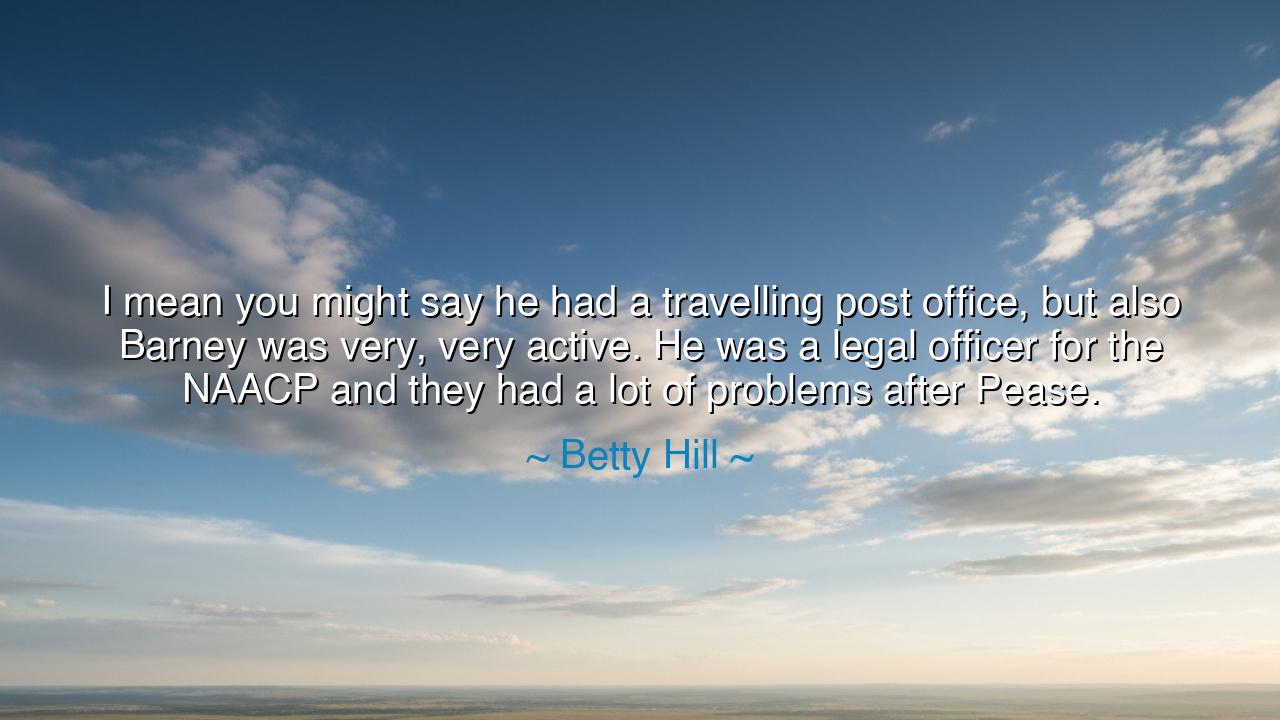
I mean you might say he had a travelling post office, but also
I mean you might say he had a travelling post office, but also Barney was very, very active. He was a legal officer for the NAACP and they had a lot of problems after Pease.






When Betty Hill said, “I mean you might say he had a travelling post office, but also Barney was very, very active. He was a legal officer for the NAACP and they had a lot of problems after Pease,” her words were not spoken lightly. They were the tender recollection of a woman remembering her husband, Barney Hill, a man of courage and conviction whose life was devoted to the pursuit of justice. Beneath her simple phrasing lies the depth of two intertwined lives — two souls who bore not only the ordinary burdens of marriage but the extraordinary weight of history. Her statement, though casual in tone, is a window into the struggle of African Americans during the civil rights movement, and into the quiet heroism of those who fought not for fame, but for dignity.
The origin of this quote can be traced to Betty Hill’s many interviews about her life with Barney. While the world came to know them through the strange and sensational story of their alleged alien abduction in 1961, their truer legacy lies in their civil rights work. Before their names entered folklore, they were already warriors for equality. Barney Hill was not merely a postal worker who traveled long distances for his job — his “travelling post office,” as Betty calls it, was symbolic of a man who carried hope and connection across a divided nation. But more than that, he was a legal officer for the NAACP, the National Association for the Advancement of Colored People — an organization that stood at the very heart of America’s moral awakening in the 20th century.
When Betty mentions that Barney was “very, very active” and that “they had a lot of problems after Pease,” she is recalling the turbulent years that followed the closure of Pease Air Force Base in New Hampshire, where racial tensions had been both visible and unspoken. Even in the supposedly progressive North, racism persisted in quiet but poisonous ways. As an officer of the NAACP, Barney faced these tensions directly, advocating for Black servicemen, postal workers, and citizens who were denied fair treatment. The “problems after Pease” were emblematic of the larger American contradiction — a nation that preached freedom while practicing discrimination. Betty’s words reveal not just her husband’s resilience, but the weight of an era in which courageous individuals became instruments of justice in the face of indifference and hostility.
Barney’s life, though not as widely celebrated as those of Martin Luther King Jr. or Rosa Parks, reflects the same moral strength that defined their generation. He was an ordinary man who chose to live extraordinarily — not through wealth or position, but through principle. The NAACP was often besieged by opposition: lawsuits, threats, and intimidation were common. Yet Barney, like so many unsung heroes of that movement, continued his work undeterred. He traveled from town to town, speaking, writing, organizing — doing what he could to make the law a shield for the oppressed, rather than a weapon for the powerful. His "travelling post office" becomes a metaphor for service — the image of a man carrying messages of hope through a landscape still scarred by prejudice.
Throughout history, such figures have walked quietly beside the giants. Think of Frederick Douglass, who once said, “Power concedes nothing without a demand.” Or Thurgood Marshall, who battled through the courts to turn legal victories into living rights. Barney Hill’s work as a legal officer placed him in that lineage — one of those who, though not standing in the spotlight, helped to build the foundation of equality upon which others could stand. The “problems after Pease” were not merely local issues; they symbolized the eternal struggle between justice and complacency, between the ideal of equality and the reality of human fear.
In Betty’s gentle remembrance there is also a deeper emotional truth: that great movements are not built only by those who march in the streets or argue before judges, but also by those who support them in silence, through love and shared sacrifice. Betty herself was no bystander. As an educator and activist, she stood with her husband in the fight, and together they bore the loneliness that often accompanies those who challenge injustice. Her words, spoken years later, carry the tenderness of memory but also the stern wisdom of experience: that every generation must nurture its own Barneys — people who, though not seeking glory, uphold the light of justice in dark times.
Let this story, and these words, be remembered as a lesson for all who come after. Justice is not born in the courtroom; it is born in the conscience. Laws can be written, but they mean nothing unless there are men and women willing to defend them, to live them, and to pay the price for their truth. The Hills remind us that progress is built not by miracles, but by the daily labors of those who refuse to give up.
And so, as Betty Hill spoke of her husband’s travels, his service, and his challenges, she was passing down more than a memory — she was giving a testament of endurance. Her words teach us that righteousness is not loud, but steadfast; that the struggle for equality must continue in every generation; and that those who labor quietly for justice often carry the heaviest burdens. In remembering Barney Hill, we remember all those who worked unseen, their lives like letters of hope sent through the long corridors of history — delivered not by the post of convenience, but by the courage of the human soul.






AAdministratorAdministrator
Welcome, honored guests. Please leave a comment, we will respond soon